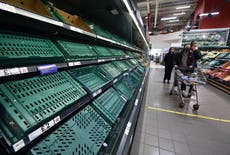Taxes worth £800m go unpaid as border checks relaxed to keep traffic flowing after Brexit
Up to 200 trucks turned back a day for having wrong paperwork, MPs told
Your support helps us to tell the story
From reproductive rights to climate change to Big Tech, The Independent is on the ground when the story is developing. Whether it's investigating the financials of Elon Musk's pro-Trump PAC or producing our latest documentary, 'The A Word', which shines a light on the American women fighting for reproductive rights, we know how important it is to parse out the facts from the messaging.
At such a critical moment in US history, we need reporters on the ground. Your donation allows us to keep sending journalists to speak to both sides of the story.
The Independent is trusted by Americans across the entire political spectrum. And unlike many other quality news outlets, we choose not to lock Americans out of our reporting and analysis with paywalls. We believe quality journalism should be available to everyone, paid for by those who can afford it.
Your support makes all the difference.Taxes totalling £800m could go unpaid this year because of border checks on lorries being scaled back to avoid queues at ports after Brexit, MPs have been told.
HM Revenue and Customs accepts that money will be lost because of a decision to prioritise free flow of traffic over revenue protection, chief executive Jim Harra told the House of Commons Public Accounts Committee.
The committee heard that significant queues have so far been avoided at ports like Dover. But border delivery group chief executive Emma Churchill said that an average of about 5 per cent of trucks - up to 200 a day - have been turned back for having the wrong paperwork or failing to provide a negative Covid test.
Up to 18 January, some 636 truckers have been handed £300 fines - a total of £190,800 - for entering Kent without an access permit for the county.
Officials said they were braced for delays to lengthen over the coming weeks as traffic movements return to nearer normal levels, and again when a grace period for imports ends in July.
So far this year, freight traffic flows to the continent have been running at only around 70 per cent of the normal level in January, with many companies believed to be holding back on exports until the new systems have bedded in.
Mr Harra told the committee: “The government did make it clear that when it came to goods movements into the UK, we would prioritise flow over revenue protection, and that is reflected in the procedures that we have put in place. That does mean that we are running some compliance risks as a result.
“We do expect that there will be some increased non-compliance, particularly in the first financial year, as a result of the easements that we have introduced.”
The government’s independent economic forecaster the Office for Budget Responsibility has predicted £200m in lost customs duty and a £600m VAT gap in 2021/22 as a result of the relaxed checks, he said.
Meanwhile, UK Border Force director general Paul Lincoln said that 1,570 additional staff had been recruited to carry out extra checks needed as a result of Brexit, with agency workers employed on a temporary basis to fill posts while permanent staff workers are trained.
Ms Churchill told the committee that around 5,000 goods lorries are currently crossing to the continent each day via the Short Straits, compared to an average 7,000 a day in a normal January.
Transport across the Channel had so far been “completely free flowing” and there had been no significant knock-on disruption on Kent roads, she said.
Numbers being turned back for having the wrong papers or no Covid test were “bobbling about between 3 per cent and 8 per cent” - the equivalent of 100-200 HGVs a day, she said.
Traffic levels were expected to return to normal levels over the next week or so, though they may remain depressed by coronavirus restrictions, she said.





Join our commenting forum
Join thought-provoking conversations, follow other Independent readers and see their replies
Comments